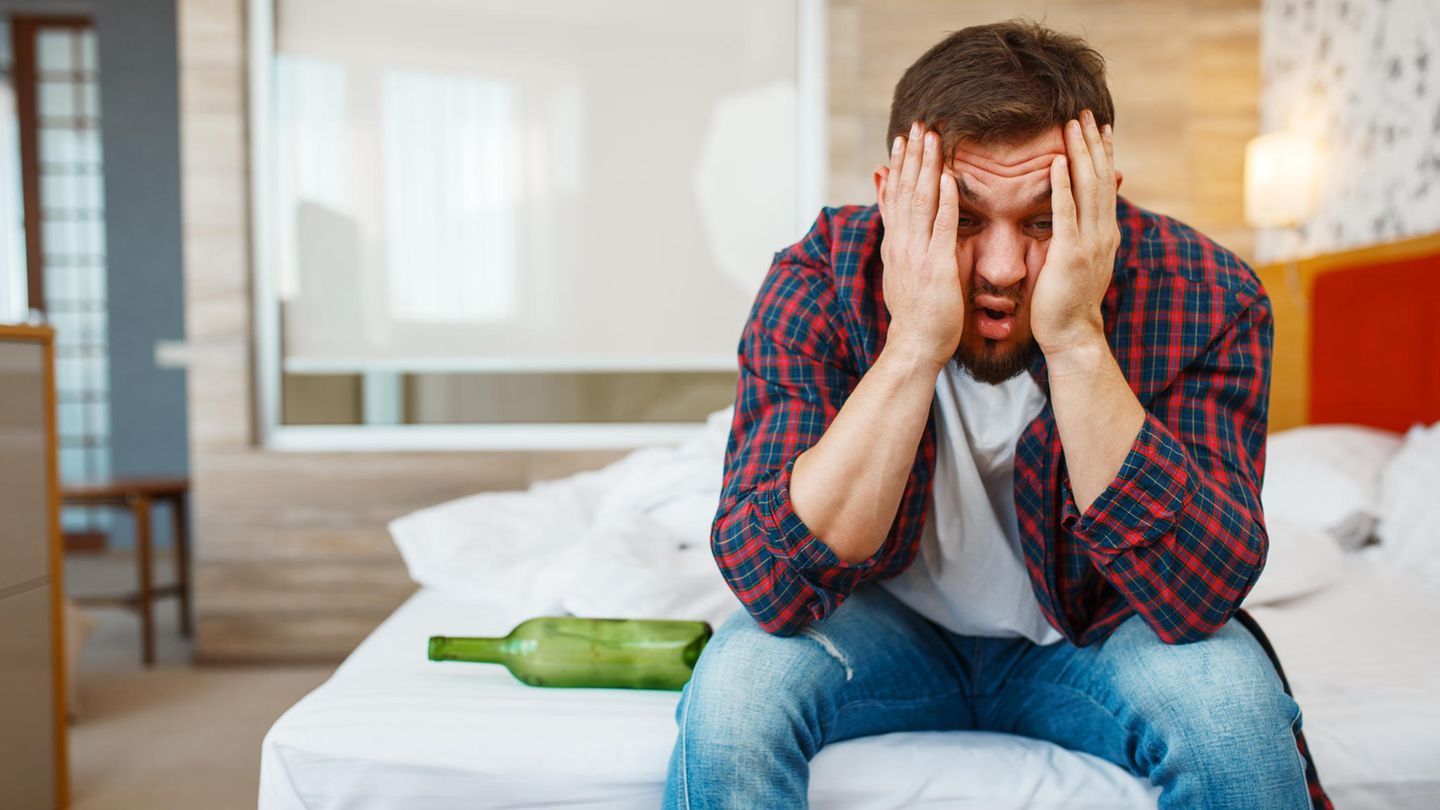Good to know
Hangxiety: Where the hungover fear of having done something stupid while drunk comes from
When the hangover follows the intoxication.
© xNomadSoulx / Imago Images
The evening was a frenzy fueled by alcohol. The next morning, however, the hangover waits. In addition to headaches and nausea, fears and restlessness are spreading. Where does the depression come from after a night of drinking?
When one shot turns into twelve, the evening might still be fun, but the next day when you wake up, there’s a good chance you’ll have a hangover waiting to say hello. He likes to have headaches and nausea in tow. The physical effects of excessive alcohol consumption are also known as hangovers. If one speaks of hangxiety, on the other hand, the psychological symptoms that occur after a night of drinking are in the foreground. The term Hangxiety is a linguistic Wolpertinger, composed of the words Hangover (hangover) and Anxiety (fear, worry, overwhelm). What is behind the hangover depression after the booze?
What are the symptoms of hangxiety?
Hangxiety typically occurs when sobering up. The symptoms are similar to those of a classic hangover. In addition to headaches and nausea, these include fatigue, tiredness, dizziness and tremors. On top of that, there are mental effects. Affected people sometimes feel overwhelmed, have fears and inner restlessness. It is also possible that the next day they are ashamed of their alcohol-pregnant behavior and fear that they have offended others. The thoughts then revolve around everything that could possibly have happened. If you then resort to alcohol again, a vicious circle can develop.
What triggers hangxiety?
From the first sip through the bloodstream to the brain, where the intoxication occurs, alcohol takes between three and five minutes. There it has a particular effect on messenger substances that have a dampening, calming and anxiolytic profile, such as gamma-aminobutyric acid (gaba). As a result, neuronal activity is inhibited and communication between cells slows down. In addition, the stimulating messenger glutamate is blocked. Instead, hormones such as adrenaline, serotonin and cortisol are increasingly released.
The body reacts to this and tries to regulate, even when the alcohol is already being broken down in the body. This “counter-regulation effect” leads to something like “restlessness, tension, nervousness. Some experience it as anxiety,” said the President of the German Society for Addiction Research and Addiction Therapy, Falk Kiefer, to “Deutschlandfunk”.
Who Gets Hangxiety?
Alcohol is also considered a social lubricant. It can have a disinhibiting effect, make you looser. But especially for people who use alcohol as a kind of crutch to overcome their shyness, consumption can boomerang. Researchers at the University of Exeter have found that introverts are more prone to hangxiety than extroverts.
“We know that many people drink alcohol to reduce their anxiety in social situations, but this research shows that this may have an impact the next day, as shy people are more likely to experience this sometimes debilitating aspect of a hangover,” said Celia Morgan, Professor at the University of Exeter. According to a study, up to twelve percent of those affected also have fears during a hangover.
What happens if…
Avoiding alcohol: How quickly the liver recovers and the body feeling improves
What helps against hangxiety?
Alcohol is gradually broken down. This takes a while. You cannot speed up this process. A tried and tested aid when sobering up is and remains water. At least that works against the dehydration that alcohol causes throughout the body, including the brain. That’s where the hangover headache comes from. Otherwise there is little more than waiting for the misery to end.
Does Hangxiety also have a positive side?
A hangover results from drinking over the limit. If we are miserable, this is proof that there is too much poison in the body. The fear or worry that comes with hangxiety can also be understood as the body’s own warning system. It may lead to those affected reflecting on their alcohol consumption and, at least for a short time, making resolutions such as “Never again alcohol!”.
Sources: IQWiG, Deutschlandfunk, Spektrum, University of Exeter, The Telegraph, New York Times, NIH


